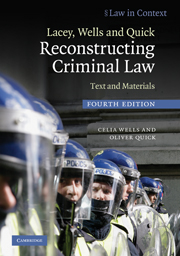Book contents
- Frontmatter
- Contents
- Preface
- Table of cases
- Table of statutes
- Section I Approaching Criminal Law
- Section II Law, Order and Security
- Section III Interpersonal Violence; Drugs and Alcohol Abuse; Offence Preparation and Participation
- Section IV Property and Propriety
- Section V Regulating Sexuality and Bodily autonomy
- Section VI Making a Killing
- 18 The Social Construction of Violence and Personal Harm
- 19 The Criminal Regulation of Public Safety
- 20 Homicide
- 21 Murder and Manslaughter
- Bibliography
- Index
- References
19 - The Criminal Regulation of Public Safety
from Section VI - Making a Killing
Published online by Cambridge University Press: 05 June 2012
- Frontmatter
- Contents
- Preface
- Table of cases
- Table of statutes
- Section I Approaching Criminal Law
- Section II Law, Order and Security
- Section III Interpersonal Violence; Drugs and Alcohol Abuse; Offence Preparation and Participation
- Section IV Property and Propriety
- Section V Regulating Sexuality and Bodily autonomy
- Section VI Making a Killing
- 18 The Social Construction of Violence and Personal Harm
- 19 The Criminal Regulation of Public Safety
- 20 Homicide
- 21 Murder and Manslaughter
- Bibliography
- Index
- References
Summary
Regulation in context
In this chapter we consider the wider context of serious injuries and deaths: those caused in road traffic accidents and at work. Both are marginalised from the mainstream of criminal law by the provision of separate offences, by differential enforcement and, in the case of workplace deaths, by the provision of a separate regulatory scheme. The marginalisation both results from and reinforces the notion that some criminal offences are neither ‘really’ criminal nor violent, despite causing death or serious injury.
One way of looking at criminal law and criminal regulation is in terms of the different conceptions which have arisen of ‘real’ crime and ‘quasi’ crime. ‘Quasi’ crime is a term used to describe offences committed largely by white collar criminals pursuing their business interests and those committing road traffic offences. We do not mean, by using these terms, to endorse that distinction. To do so would be to suggest that environmental pollution or injuries resulting from breaches of health and safety regulations are conceptually different from assaults or thefts. This is difficult to justify. It is the existence of the distinction in the ideology of criminal law that we emphasise. Although it has been thought necessary to subject much business activity to a form of regulation and, frequently, to back this up with a criminal sanction, completely separate enforcement agencies have developed with distinctive styles of operation.
- Type
- Chapter
- Information
- Lacey, Wells and Quick Reconstructing Criminal LawText and Materials, pp. 654 - 691Publisher: Cambridge University PressPrint publication year: 2010



